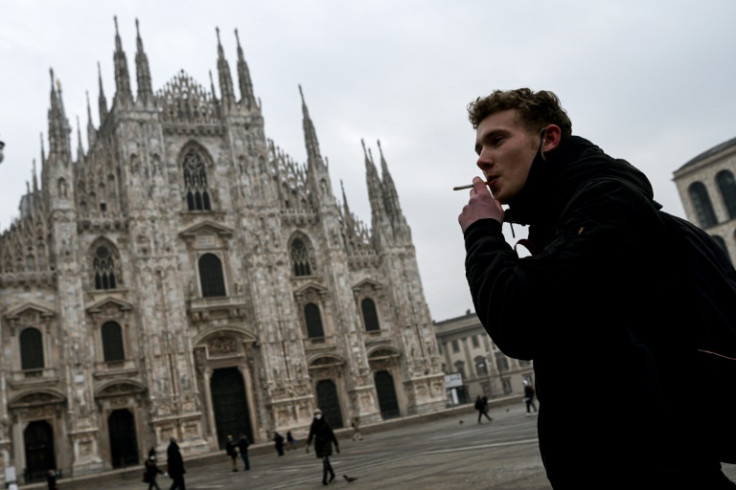
Smokers in Italy's financial and fashion capital of Milan risk being fined for lighting up on city streets or crowded public areas, after the country's toughest ban comes into effect Wednesday.
Those who defy the new prohibition in the polluted northern Italian city could be fined between 40 to 240 euros ($41 to $249), a punishment that does not sit well with all residents.
"The new law is excessive in my opinion. I agree not to smoke indoors, not to smoke near an elderly person or a child, but banning smoking outdoors for me somewhat limits a person's freedom," local plumber Morgan Ishak, 46, told AFP ahead of the ban.
Milan's air quality ordinance, passed in 2020 by the city council, called for progressively stricter bans on smoking.
Starting in 2021, it was forbidden to smoke in parks and playgrounds as well as bus stops and sports facilities.
The latest smoking ban, effective January 1, applies to "all public spaces, including streets", with the exception of "isolated places where it is possible to maintain a distance of at least 10 metres from other people", according to the text.
Local officials say the measure is aimed at reducing particulates in the air to "improve the quality of the city's air, to protect the health of citizens, including protection from passive smoking in public places, also frequented by children", according to a statement.
Stellina Lombardo, 56, a non-smoker, said she supported the harsher smoking ban.
"I agree very much because smoking is responsible for a lot of pollution, in this era when we suffer a lot from climate change such a measure can help to scale down the effects of pollution that is devastating the planet," she said.
The ban -- which comes ahead of the Milan-Cortina 2026 Winter Olympics -- does not apply to e-cigarettes.
Situated in the middle of the industrial Po Valley and choked with road traffic, Milan is one of Europe's most polluted cities in terms of air.
Italy's first national smoking ban, in 1975, banned smoking on public transportation and in classrooms and certain other areas.
In 1995, the ban was extended to public administration areas and in 2005 to all enclosed public areas, making it at the time a pioneer in Europe.
Some 19 percent of Italians smoke, according to the National Institute of Statistics (ISTAT) based on 2023 data, lower than the 24 percent average within the European Union.
Averaging around six euros a pack in Italy, cigarettes are also among the cheapest in Europe, where prices of about 10 euros are more common.
Italy's health ministry says that 93,000 deaths per year are attributed to smoking.
Smoking is responsible for roughly 85 percent of all cases of lung cancer, the deadliest cancer worldwide, according to the World Health Organization.
Within the European Union, 17 countries have passed smoke-free legislation, with Ireland, Greece, Bulgaria, Malta, Spain and Hungary the strictest.
In November, a world-leading proposal in Britain to phase out smoking by young people passed its first parliamentary hurdle, with lawmakers overwhelmingly voting in favour.
The bill would prevent anyone born after January 1, 2009 from legally smoking by gradually raising the age at which tobacco can be bought.
The government has said it is aimed at creating Britain's first "smoke-free generation".
In Europe, the fewest smokers are found in Sweden, where 8 percent of the population lights up.
Worst off is Bulgaria, with smokers making up 37 percent.



